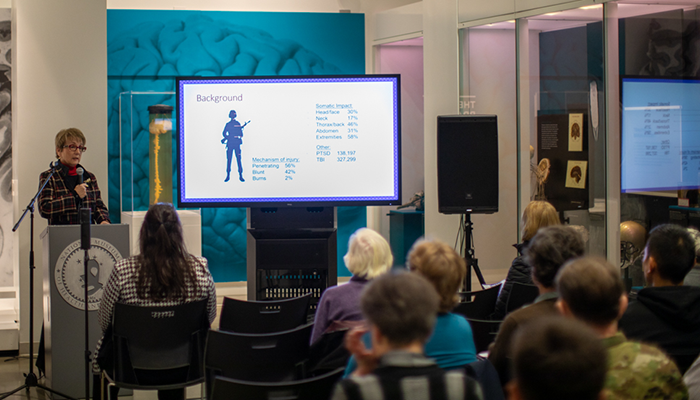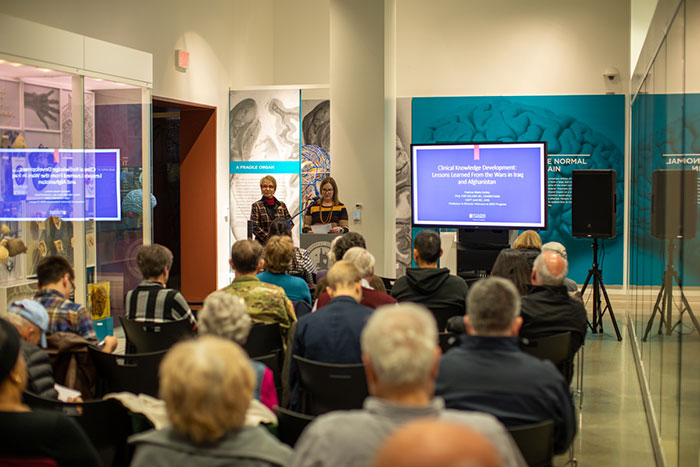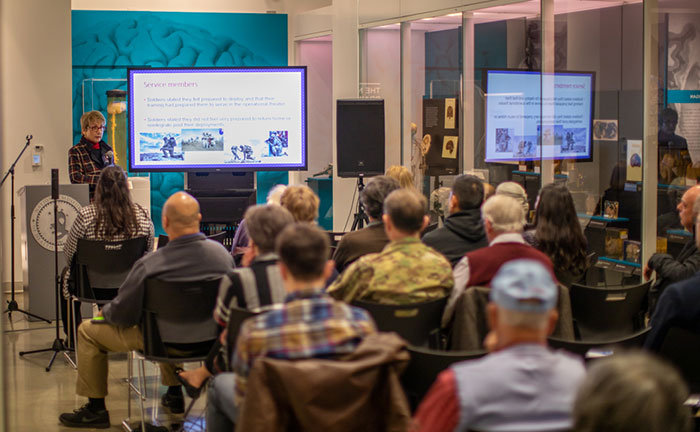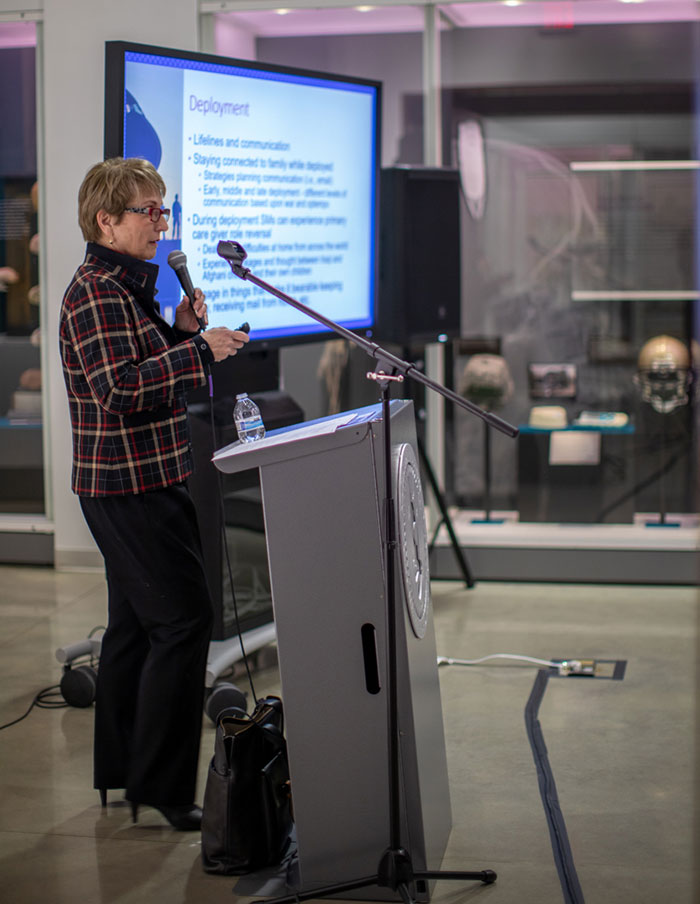Stories of Service From the Wars in Iraq and Afghanistan Yield New Clinical Competencies for Nurses
By Jacqueline Gase
NMHM Public Affairs Coordinator

Retired U.S. Navy Capt. Patricia Kelley describes common locations and common types of injuries for service members in the wars in Iraq and Afghanistan during the Jan. 28, 2020, Medical Museum Science Café titled "Clinical Knowledge Development: Medical and Transport Lessons Learned From the Wars in Iraq and Afghanistan" at the National Museum of Health and Medicine in Silver Spring, Maryland. (NMHM photo)
A variety of military nursing studies funded by the TriService Nursing Research Program provide personal insight into the medical lessons learn and ethical concerns of nurses and service members from the wars in Iraq and Afghanistan. During the museum's Jan. 28, 2020, Medical Museum Science Café titled "Clinical Knowledge Development – Medical and Transport Lessons Learned from the Wars in Iraq and Afghanistan," Patricia Watts Kelley, Ph.D., RN, FAANP, FAAN a retired Navy Captain shared the analysis and clinical competencies developed from these studies.
Kelley and her team visited several military medical treatment centers and Veteran Administration medical centers. The team interviewed military and civilian nurses regarding clinical knowledge development, and wounded service members about their experiences and wounded care journeys.
Based on the responses, Kelley and her team were able to determine and capture what the nurses and service members thought were the clinical competencies required for a military or federal nurse case manager: meeting, knowing, and tracking the patients' past, present, and future; simplifying the point of contact in and between institutions; knowing the patient and coordinating care; being an advocate for the patient; supporting and integrating the family into the healthcare team; advocating for adequate living environments; and being a life and health coach.
"Everybody needs a friendly voice and a hand to help them. When you do talk to the patients, they usually always name the nurse as the person who can help them navigate the health care system," said Kelley.
The narrative stories shared by the wounded service members detailed the proactive and constant care of a nurse care manager.
"I like my case manager. She really takes care of me. If something needs to be done, she'll personally go up there and do it. Like, instead of making a phone call, she'll walk over there and personally take care of it. She makes sure it gets done. And then she'll call me immediately and tell me what happened. My case manager calls me more than my wife does."
In another study highlighted by Kelley, the nurses explained some of the ethical concerns they dealt with in the delivery of care during the wars in Iraq and Afghanistan. The ethical questions centered around integrating the professional nursing code of ethics and military code of conduct, service issues, caring for the enemy, and a lack of closure, but a major source of conflict was the allocation of resources.
"If they had one instrument tray, who used it? Did they do the brain surgery on the service member who was hit with an IED, or do they use the tray to do a brain surgery on the guy who set off the IED," asked Kelley. According to Kelley, this was a difficult issue to reconcile, but the majority of the nurses talked about how their job was to care for patients based on a triage system, irrespective of who that patient was.
The final study Kelley discussed focused on the preparedness nurses and service members felt while they were deployed to the war zone and when they returned home. "The nurses felt they were prepared to take care of the patients, but they weren't prepared to deal with their personal safety [while in a warzone]," said Kelley.
However, service members felt their military training had prepared them to deploy to war, but they felt uncertain about returning home and reintegrating into society. "A lot of people said they just couldn't slow down. They couldn't shut it off. They felt like they were on overdrive all the time," said Kelley.
Through the narratives and experiences provided by the nurses and service members, Kelley and her team's studies have led to changes in how to best approach the care of wounded and healing service members. She also stressed military nurses are dual-hatted – a nurse and service member – and they struggle to integrate their war experiences too.
"The museum has a long history of sharing the contributions of nurses through its collections, exhibits, and public programs," said Andrea Schierkolk, NMHM Public Programs Manager. "Dr. Kelley's research demonstrates the value of the relationship between patient and caregiver as a means by which to gauge the effectiveness of meeting the challenges of clinical competencies," said Schierkolk.
NMHM's public programs provide forums for informal learning to connect the mission of the Department of Defense museum with the public. NMHM was founded as the Army Medical Museum in 1862 and is a division of the Defense Health Agency Research and Development Directorate.






